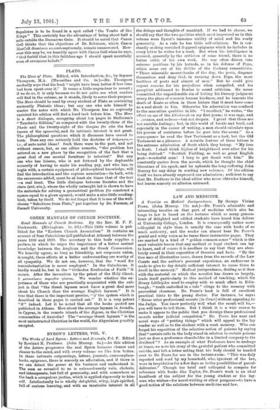LAW AND MEDICINE.
A Treatise on Medical Jurisprudence. By George Vivian Poore. (John Murray. 12s. net.)—Dr. Poore's admirable and interesting treatise on that part of medicine which also be- longs to law is based on the lectures which so many genera- tions of delighted and edified students have heard him deliver at University College, London. It is consequently rather more colloquial in style than is usually the case with books of so much authority, and the reader can almost hear Dr. Poore's genial and witty voice as he turns these instructive pages. They are marked by a kind of "golden common-sense" which is the most valuable lesson that any medical or legal student can lay to heart, and of course it is needless to say that they are abso- lutely sound in their exposition of theories and facts. "By the free uses of illustrative cases, drawn from the records of the Law Courts and the author's personal experience, an endeavour is made to give to dry details sufficient interest to cause them to dwell in the memory." Medical jurisprudence, dealing as it does with the material on which the novelist has drawn so largely, lends itself particularly to this method of teaching, which Sir Henry Littlejohn used to employ with so much effect in Edin- burgh: "truth embodied in a tale" clings to the memory with proverbial closeness. Dr. Poore's book is full of excellent practical hints to the young doctor. For instance, he says : "Never utter professional secrets [in Court] without appealing to the Judge. You know perfectly well what the result will be,— you will have to tell them. But I think it is a wise course to make it appear to the public that you divulge these professional secrets under judicial compulsion." Dr. Poore has neat and novel ways of "putting things" which will appeal to the lay reader as well as to the student with a weak memory. Who can forget his exposition of the selective action of poisons by saying that" certain cells in the body stand in relation to certain poisons just as does a preference shareholder in a limited company to the dividend " ? As an example of what Professors have to undergo at times, we note his story of the grateful patient who committed suicide, and left a letter asking that his body should be handed over to Dr. Poore for use in the lecture-room : "This was duly reported and read by my household, who, ignorant of the law, were in trepidation for a few days as to the possibilities of parcel- deliveries." Though too brief and colloquial to compete for reference with books like Taylor, Dr. Poore's work is an ideal handbook of the subject for the young student or the lay- man who wishes—for novel-writing or other purposes—to have a good notion of the relations between medicine and law.






































 Previous page
Previous page